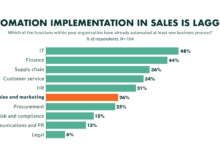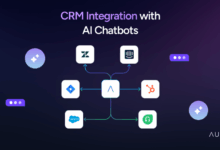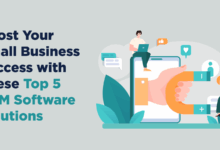AI-Powered CRM Software: Revolutionizing Business
AI-Powered CRM Software is transforming how businesses manage customer relationships. This technology leverages artificial intelligence to automate tasks, analyze data, and provide actionable insights, leading to improved efficiency, increased sales, and enhanced customer satisfaction. Unlike traditional CRM systems that rely primarily on manual data entry and basic reporting, AI-powered solutions offer predictive capabilities, personalized customer experiences, and proactive engagement strategies.
This exploration delves into the core functionalities of AI-powered CRM, examining its benefits across sales, marketing, and customer service. We’ll explore various AI features, discuss implementation strategies, and consider the future of this rapidly evolving technology, including ethical implications. The goal is to provide a comprehensive understanding of how AI is reshaping the CRM landscape and empowering businesses to achieve greater success.
Defining AI-Powered CRM Software
AI-powered CRM software represents a significant evolution in customer relationship management, leveraging artificial intelligence to automate tasks, analyze data, and improve overall efficiency and effectiveness. It goes beyond the capabilities of traditional CRM systems by incorporating machine learning algorithms and predictive analytics to provide businesses with deeper insights into customer behavior and preferences.
Core Functionalities of AI-Powered CRM Software
AI-powered CRM systems offer a range of functionalities designed to streamline various aspects of customer interaction and business operations. These functionalities extend beyond the basic contact management and sales pipeline tracking found in traditional systems. Key functionalities include lead scoring and prioritization, automated email marketing campaigns, predictive sales forecasting, and personalized customer service interactions. The integration of AI allows for proactive identification of potential opportunities and risks, leading to more informed decision-making.
Key Differences Between Traditional and AI-Powered CRM Systems
Traditional CRM systems primarily focus on data storage, retrieval, and basic reporting. They require significant manual input and offer limited analytical capabilities. In contrast, AI-powered CRM systems automate many manual tasks, provide advanced analytics, and offer predictive capabilities. This difference translates to increased efficiency, improved sales conversion rates, and a more personalized customer experience. Traditional systems rely heavily on human intervention for tasks such as lead qualification and segmentation, whereas AI-powered systems automate these processes, freeing up human resources for more strategic initiatives.
Examples of AI Features Integrated into CRM Platforms
Numerous AI features are being integrated into modern CRM platforms. For instance, natural language processing (NLP) enables automated customer service through chatbots, analyzing customer inquiries and providing instant responses. Machine learning algorithms power predictive lead scoring, identifying high-potential leads based on historical data and behavioral patterns. Computer vision can be used to analyze images and videos for customer sentiment analysis, offering insights into customer reactions to products or services. Finally, recommendation engines personalize marketing campaigns and product recommendations, enhancing customer engagement and satisfaction.
Comparison of Leading AI-Powered CRM Solutions
| Feature | Salesforce Einstein | Microsoft Dynamics 365 AI | HubSpot CRM with AI |
|---|---|---|---|
| Predictive Lead Scoring | Strong; uses machine learning to predict lead conversion probability. | Strong; offers predictive lead scoring and identifies high-potential leads. | Good; provides lead scoring based on various factors, including engagement. |
| Customer Service Automation | Excellent; offers AI-powered chatbots and virtual assistants. | Good; integrates with various communication channels for automated responses. | Good; utilizes chatbots and automated workflows for customer support. |
| Sales Forecasting | Strong; utilizes historical data and machine learning to predict future sales. | Good; provides sales forecasting capabilities based on various data points. | Good; offers sales forecasting tools, though less sophisticated than Salesforce. |
| Pricing | Higher; reflects its comprehensive features and advanced AI capabilities. | Mid-range; offers various pricing plans depending on the features and user needs. | Lower; especially attractive for smaller businesses due to its freemium model. |
| Strengths | Comprehensive AI features, robust platform, extensive integrations. | Strong integration with other Microsoft products, user-friendly interface. | Ease of use, affordability, strong marketing automation capabilities. |
| Weaknesses | High cost, complex implementation for smaller businesses. | Can be less customizable than other platforms. | Less advanced AI features compared to Salesforce and Dynamics 365. |
Benefits and Use Cases
AI-powered CRM systems offer a significant leap forward in sales, customer service, and marketing, streamlining operations and boosting efficiency. By leveraging machine learning and predictive analytics, these systems provide valuable insights and automation capabilities that were previously unimaginable. This leads to improved productivity, increased revenue, and enhanced customer satisfaction.
Advantages for Sales Teams
AI significantly boosts sales team performance. Predictive lead scoring, for instance, identifies the most promising leads, allowing sales representatives to prioritize their efforts and focus on high-probability conversions. Automated lead routing assigns leads to the most appropriate sales representative based on skills, territory, and other relevant factors. Furthermore, AI-driven sales forecasting provides more accurate predictions of future sales, enabling better resource allocation and strategic planning. Sales representatives also benefit from AI-powered tools that suggest personalized communication strategies based on individual customer profiles, improving engagement and closing rates.
AI Improvements in Customer Service and Support
AI revolutionizes customer service by providing instant, 24/7 support through chatbots and virtual assistants. These intelligent systems can handle routine inquiries, freeing up human agents to focus on more complex issues. AI-powered sentiment analysis helps identify unhappy customers, allowing for proactive intervention and improved issue resolution. Automated ticket routing ensures that customer issues are directed to the appropriate department or individual, reducing resolution times. Knowledge bases are enhanced by AI, making it easier for both agents and customers to quickly find answers to common questions. This leads to increased customer satisfaction and loyalty.
AI Enhancement of Marketing and Lead Generation
AI-powered CRM systems significantly enhance marketing and lead generation efforts. AI algorithms analyze vast amounts of customer data to identify ideal customer profiles, enabling more targeted marketing campaigns. Personalized email marketing campaigns, driven by AI, deliver more relevant content to individual customers, increasing engagement and conversion rates. AI-driven ad targeting optimizes ad spend by focusing on the most receptive audiences, improving ROI. Predictive analytics helps identify potential churn, allowing businesses to proactively address customer concerns and prevent loss of business. Lead scoring, mentioned previously, also plays a vital role in efficient marketing resource allocation.
Case Study: “GreenThumb Gardens”
GreenThumb Gardens, a fictional online retailer of gardening supplies, implemented an AI-powered CRM. Prior to implementation, their sales team struggled with lead prioritization and customer service response times were slow. After integrating the AI system, GreenThumb saw a 25% increase in sales conversion rates within six months. This was attributed to AI-driven lead scoring, which allowed the sales team to focus on high-value prospects. Customer service response times decreased by 40% due to AI-powered chatbots handling routine inquiries. Furthermore, AI-driven marketing campaigns resulted in a 15% increase in website traffic and a 10% increase in online sales. GreenThumb’s customer satisfaction scores also improved significantly, reflecting the positive impact of the AI-powered CRM on their overall operations.
AI Features and Capabilities
AI-powered CRM systems leverage a range of sophisticated functionalities to enhance sales, marketing, and customer service operations. These capabilities go beyond basic data storage and retrieval, offering predictive insights and automated processes that significantly improve efficiency and effectiveness. This section details the core AI features and their impact.
Predictive Analytics and Lead Scoring
Predictive analytics utilizes historical data and machine learning algorithms to forecast future outcomes. In a CRM context, this means predicting which leads are most likely to convert into paying customers. Lead scoring systems, often powered by predictive analytics, assign numerical values to leads based on various factors like engagement, demographics, and website activity. Higher scores indicate a greater likelihood of conversion, allowing sales teams to prioritize their efforts on the most promising prospects. For example, a predictive model might analyze past customer data to identify key characteristics of high-value customers, then score new leads based on how closely they match those characteristics. This allows sales teams to focus their efforts and resources more efficiently.
Chatbot Integration
AI-powered chatbots provide instant customer support and lead qualification. These chatbots use natural language processing (NLP) to understand and respond to customer inquiries, 24/7. They can answer frequently asked questions, gather information from leads, and even schedule appointments, freeing up human agents to handle more complex issues. A well-integrated chatbot can significantly reduce response times and improve customer satisfaction. For instance, a chatbot on a company’s website could qualify leads by asking questions about their needs and budget, then routing qualified leads to a sales representative.
Natural Language Processing (NLP) and CRM Efficiency
Natural Language Processing (NLP) is crucial for enhancing CRM efficiency. NLP allows the system to understand and interpret human language, extracting valuable insights from unstructured data like customer emails, support tickets, and social media posts. This capability enables sentiment analysis (determining the emotional tone of customer communications), topic extraction (identifying key themes in customer feedback), and automated summarization (condensing large volumes of text into concise summaries). This translates to faster response times, improved customer understanding, and more effective targeting of marketing campaigns. For example, NLP can analyze customer reviews to identify recurring issues or areas for improvement in a product or service.
AI Algorithms in CRM Systems
Various AI algorithms power different CRM functionalities. Decision trees are commonly used for lead scoring, classifying leads based on a set of predefined rules. Support vector machines (SVMs) can be used for classification tasks, such as identifying high-value customers or predicting customer churn. Neural networks, particularly deep learning models, are used for more complex tasks like sentiment analysis and image recognition. The choice of algorithm depends on the specific task and the nature of the data. For instance, a simple linear regression model might suffice for predicting sales based on historical data, while a more complex neural network might be necessary for analyzing customer sentiment from unstructured text data.
AI-Powered CRM Features Categorized by Impact
The following lists categorize AI-powered CRM features based on their primary impact on sales, marketing, and customer service.
- Sales: Predictive lead scoring, sales forecasting, opportunity management, automated sales activity tracking, personalized sales recommendations.
- Marketing: Predictive campaign optimization, personalized email marketing, lead nurturing automation, customer segmentation, social media monitoring and analysis.
- Customer Service: AI-powered chatbots, automated ticket routing, sentiment analysis of customer feedback, self-service knowledge bases, proactive customer support.
Implementation and Integration
Successfully implementing AI-powered CRM software requires a strategic approach that considers various factors, from data migration to ongoing training and optimization. A phased implementation, coupled with robust change management, is crucial for minimizing disruption and maximizing the return on investment.
Implementing AI-powered CRM software involves a multi-stage process that demands careful planning and execution. This process goes beyond simply installing the software; it requires a deep understanding of the business’s needs, data structure, and existing technological infrastructure. Ignoring these critical aspects can lead to significant challenges and ultimately hinder the success of the implementation.
Data Migration Strategies
Effective data migration is paramount for a seamless transition. This involves a careful assessment of existing CRM data, cleaning and transforming it to be compatible with the new AI-powered system. Data cleansing is crucial to ensure accuracy and reliability of the AI’s learning process. A well-defined data mapping strategy, outlining the correspondence between fields in the old and new systems, is essential. This minimizes errors and ensures data integrity throughout the migration process. Consider using a phased approach, migrating data in smaller batches to allow for monitoring and error correction. For example, migrating customer data first, then sales data, followed by marketing campaign data, allows for focused troubleshooting and validation at each stage.
System Configuration and Customization
System configuration involves setting up the AI-powered CRM to align with the business’s specific requirements. This includes defining workflows, customizing dashboards, and configuring the AI models to prioritize relevant tasks. For instance, a sales team might prioritize lead scoring based on specific demographics or purchase history, while a marketing team might focus on personalized email campaigns. Careful consideration should be given to user roles and permissions to ensure data security and efficient collaboration. Customization should be approached iteratively, starting with core functionalities and gradually adding more advanced features as needed.
Training the AI-Powered CRM System
Training an AI-powered CRM system is an iterative process requiring a structured approach. It begins with defining clear objectives and key performance indicators (KPIs) for the AI to optimize. This might involve improving lead conversion rates, increasing customer retention, or enhancing sales forecasting accuracy. The system then needs to be fed with high-quality, labeled data, allowing the AI to learn patterns and make accurate predictions. Regular monitoring and evaluation of the AI’s performance are essential, with adjustments made to the training data or model parameters as needed. For example, if the AI is underperforming on lead scoring, additional data on successful conversions might need to be provided. This ongoing refinement ensures the AI continuously improves its accuracy and effectiveness. A feedback loop incorporating user input is also crucial for continuous improvement.
Integration Challenges and Best Practices
Integrating an AI-powered CRM with existing systems can present challenges, including data compatibility issues, security concerns, and the need for specialized technical expertise. Best practices include thorough pre-integration testing, establishing clear communication channels between IT teams and vendors, and developing a comprehensive integration plan. For example, ensuring data security involves careful consideration of encryption protocols and access controls. Addressing these challenges proactively can prevent costly delays and disruptions during the implementation process. Regular maintenance and updates are also critical to ensure the seamless operation of the integrated system.
Future Trends and Developments
The landscape of AI-powered CRM is constantly evolving, driven by advancements in machine learning, natural language processing, and big data analytics. We are moving beyond basic automation towards more sophisticated systems capable of proactive engagement and predictive insights, transforming how businesses interact with their customers.
The next five years will witness significant shifts in the capabilities and applications of AI within CRM. These advancements will not only enhance efficiency and productivity but also redefine customer relationship management itself.
Emerging Trends in AI-Powered CRM Technology
Several key trends are shaping the future of AI-powered CRM. These include the increased adoption of hyper-personalization, leveraging predictive analytics for improved sales forecasting and customer retention, and the integration of AI-driven chatbots and virtual assistants for seamless customer support. The growing use of generative AI for content creation and automated email responses will also significantly impact CRM workflows. Furthermore, the increasing reliance on ethical AI development and deployment will guide the evolution of the technology.
Predictions for the Future of AI’s Role in CRM
We predict a significant increase in the use of AI for proactive customer engagement. Instead of simply reacting to customer interactions, CRM systems will anticipate needs and proactively offer solutions. For example, an e-commerce platform might use AI to identify customers at risk of churn and offer personalized discounts or loyalty programs before they leave. Sales forecasting will become more accurate and granular, allowing businesses to optimize inventory management and resource allocation more effectively. This will be facilitated by improved predictive models that incorporate a wider range of data sources, including social media sentiment and economic indicators. The integration of AI across various business functions, leading to a more holistic view of the customer, will also be a prominent trend. Companies like Salesforce are already leading this charge, constantly integrating new AI features into their CRM platform.
Ethical Considerations Related to AI in CRM
The use of AI in CRM raises several ethical concerns. Data privacy and security are paramount. The responsible use of customer data, ensuring compliance with regulations like GDPR and CCPA, is crucial. Algorithmic bias is another major concern. AI models trained on biased data can perpetuate and amplify existing inequalities, leading to unfair or discriminatory outcomes. Transparency and explainability are also important. Businesses need to be able to understand how AI-driven decisions are made to ensure fairness and accountability. Finally, the potential for AI to manipulate or exploit customers needs careful consideration. Robust ethical guidelines and regulatory frameworks are essential to mitigate these risks.
Anticipated Evolution of AI-Powered CRM (Visual Representation)
Imagine a timeline spanning five years. Year 1 depicts a CRM system primarily focused on automation of routine tasks, like lead scoring and email marketing. Year 2 shows the integration of more sophisticated predictive analytics, enabling proactive customer engagement and improved sales forecasting. Year 3 features the widespread adoption of AI-powered chatbots and virtual assistants, handling a significant portion of customer interactions. Year 4 illustrates the emergence of hyper-personalized customer experiences, driven by AI-powered recommendations and tailored content. Year 5 depicts a fully integrated AI-driven CRM system, seamlessly connecting all business functions and providing a holistic 360-degree view of each customer, with a strong emphasis on ethical considerations and responsible AI practices built into its core functionality. This holistic view is represented by interconnected nodes representing various data sources and business functions, all converging on a central customer profile managed by the AI-powered CRM. The size and complexity of the interconnected nodes grow progressively larger and more intricate throughout the five-year timeline, symbolizing the increasing sophistication and integration of AI capabilities.
Epilogue
In conclusion, AI-powered CRM software represents a significant advancement in customer relationship management. By automating tasks, providing predictive insights, and personalizing customer interactions, it empowers businesses to optimize their operations, enhance customer experiences, and drive revenue growth. While challenges exist in implementation and ethical considerations warrant attention, the potential benefits of this technology are undeniable, promising a future where businesses can leverage AI to build stronger, more profitable relationships with their customers.





